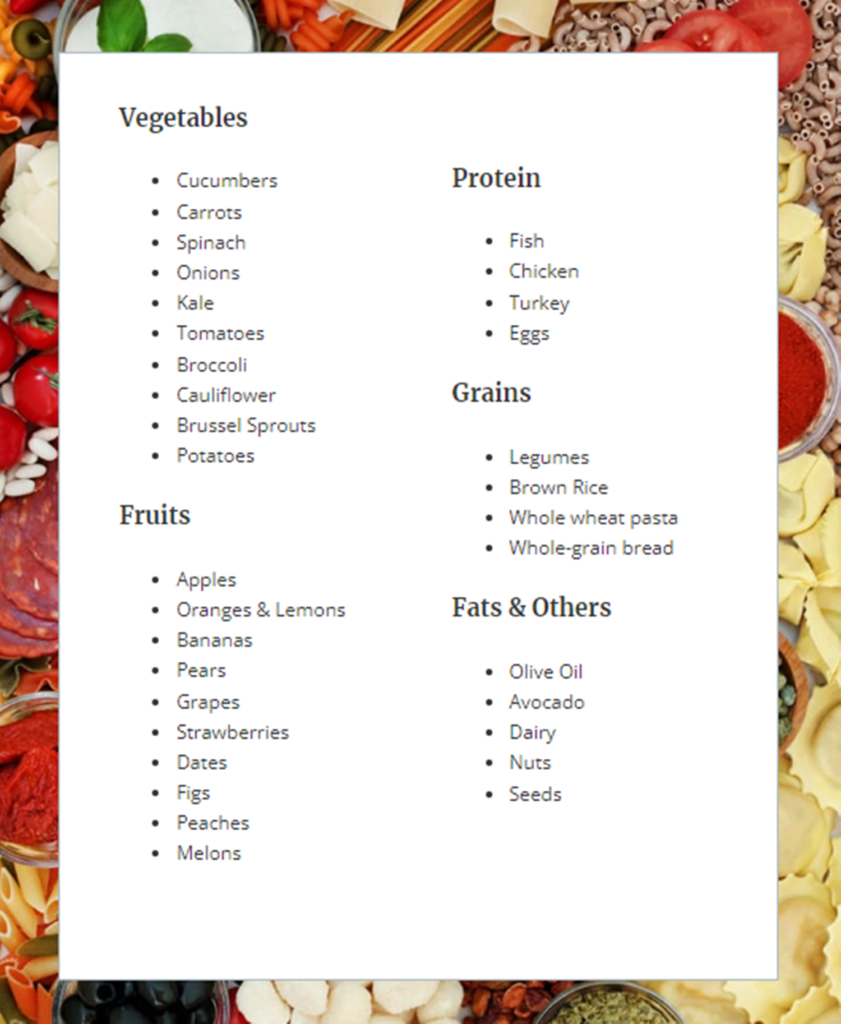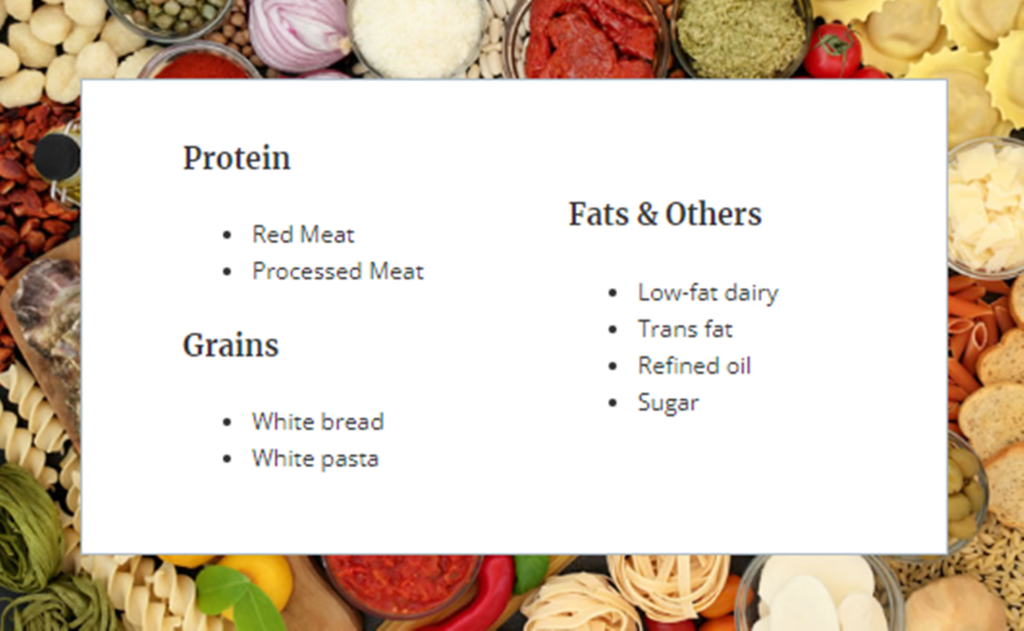Mediterranean Diet: The Mediterranean diet is both tasty and nourishing since it is full of rich Rich in flavorful ingredients including fruits, vegetables, whole grains, and heart-healthy fats.
It’s also linked to a number of advantages, including those that may boost brain function, advance heart health, control blood sugar levels, and more.
There are numerous broad suggestions you can follow to incorporate the tenets of the diet into your daily routine, even if there are no specific directions for how to follow the Mediterranean diet.
This article takes a closer look at what the Mediterranean diet is, how to follow it, and how it can affect your health.
What is the Mediterranean Diet?
The Mediterranean Diet is a way of eating that emphasizes plant-based foods and healthy fats.
In general, if you follow a Mediterranean Diet, you’ll eat:
- Lots of vegetables, fruit, beans, lentils and nuts.
- Lots of whole grains, like whole-wheat bread and brown rice.
- Plenty of extra virgin olive oil (EVOO) as a source of healthy fat.
- A moderate amount of fish, especially fish rich in omega-3 fatty acids.
- A moderate amount of cheese and yogurt.
- Little or no meat, choosing poultry instead of red meat.
- Little or no sweets, sugary drinks or butter.
- A moderate amount of wine with meals (but if you don’t already drink, don’t start).
A dietitian can help you modify this diet as needed based on your medical history, underlying conditions, allergies and preferences.
What is the definition of the Mediterranean Diet?
There are many definitions of the diet (each with slightly different goals for servings). That’s because the diet focuses on overall eating patterns rather than strict formulas or calculations. It’s also based on eating patterns across many different Mediterranean countries, each with their own nuances. Because there’s no single definition, the Mediterranean Diet is flexible, and you can tailor it to your needs.
Recommended: Keto Diet: Weight Loss, Risks, Benefits, Food to Eat & Avoid
What are the benefits of the Mediterranean Diet?
The Mediterranean Diet has many benefits, including:
- Lowering your risk of cardiovascular disease.
- Supporting a body weight that’s healthy for you.
- Supporting healthy blood sugar, blood pressure and cholesterol.
- Lowering your risk of metabolic syndrome.
- Supporting a healthy balance of gut microbiota (bacteria and other microorganisms) in your digestive system.
- Lowering your risk for certain types of cancer.
- Slowing the decline of brain function as you age.
- Helping you live longer.
Cardiologists often recommend the Mediterranean Diet because extensive research supports its heart-healthy benefits. One study (published in 2018) looked at people at high risk of cardiovascular disease over a five-year period. These people were split into two groups. One group followed the Mediterranean Diet, and the other group followed a low-fat diet. The Mediterranean Diet group had a 30% lower relative risk of cardiovascular events compared to the low-fat diet group. Such events included heart attack, stroke or cardiovascular-related death.
Researchers believe these protective benefits are partly due to the healthy fats you eat with the Mediterranean Diet. These come from foods like olive oil, nuts and fish.
How to follow it
- Eat: vegetables, fruits, nuts, seeds, legumes, potatoes, whole grains, herbs, spices, fish, seafood, and extra virgin olive oil
- Eat in moderation: poultry, eggs, cheese, and yogurt
- Eat rarely: red meat, sugar-sweetened beverages, added sugars, processed meat, refined grains, refined oils, and other highly processed foods
Foods to Eat
Exactly which foods belong to the Mediterranean diet is controversial, partly because there’s variation between countries.
The diet examined by most studies is high in healthy plant foods and relatively low in animal products and meat. However, eating fish and seafood is recommended at least twice a week.
The Mediterranean lifestyle also involves regular physical activity, sharing meals with other people, and minimizing stress levels.
You can include a mix of fresh, frozen, dried, and canned fruits and vegetables, but check package labels for added sugar and sodium.
Ideally, you should base your diet on these healthy Mediterranean foods:
- Vegetables: tomatoes, broccoli, kale, spinach, onions, cauliflower, carrots, Brussels sprouts, cucumbers, potatoes, sweet potatoes, turnips
- Fruits: apples, bananas, oranges, pears, strawberries, grapes, dates, figs, melons, peaches
- Nuts, seeds, and nut butters: almonds, walnuts, macadamia nuts, hazelnuts, cashews, sunflower seeds, pumpkin seeds, almond butter, peanut butter
- Legumes: beans, peas, lentils, pulses, peanuts, chickpeas
- Whole grains: oats, brown rice, rye, barley, corn, buckwheat, whole wheat bread and pasta
- Fish and seafood: salmon, sardines, trout, tuna, mackerel, shrimp, oysters, clams, crab, mussels
- Poultry: chicken, duck, turkey
- Eggs: chicken, quail, and duck eggs
- Dairy: cheese, yogurt, milk
- Herbs and spices: garlic, basil, mint, rosemary, sage, nutmeg, cinnamon, pepper
- Healthy fats: extra virgin olive oil, olives, avocados, and avocado oil

Foods to Limit
You should limit these processed foods and ingredients when following the Mediterranean diet:
- Added sugar: added sugar is found in many foods but especially high in soda, candies, ice cream, table sugar, syrup, and baked goods
- Refined grains: white bread, pasta, tortillas, chips, crackers
- Trans fats: found in margarine, fried foods, and other processed foods
- Refined oils: soybean oil, canola oil, cottonseed oil, grapeseed oil
- Processed meat: processed sausages, hot dogs, deli meats, beef jerky
- Highly processed foods: fast food, convenience meals, microwave popcorn, granola bars

Beverages
Water should be your go-to beverage on a Mediterranean diet.
This diet also includes moderate amounts of red wine — around one glass per day.
However, this is completely optional, and wine should be avoided by some people including, anyone who is pregnant, has difficulty drinking in moderation, or is taking certain medications that may interact with alcohol.
Coffee and tea are also healthy beverage choices on the Mediterranean diet. Be mindful of adding lots of added sugar or cream.
You’ll want to limit sugar-sweetened beverages, such as soda or sweet tea, which are very high in added sugar. Fruit juice would be OK to include in moderation, but you’re better off choosing whole fruits to get the benefit of fiber.
What to Drink
Beverages on the Mediterranean diet are easy; water and red wine. These two drinks of choice are another reason the Mediterranean diet is heart-healthy.
Coffee and tea are acceptable beverages also, but without added sugar and sweeteners. You should, as a rule, avoid sugar-sweetened beverages.
Snacks
The Mediterranean diet is meal-heavy at three meals a day, but a snack or two is also welcomed. Snacks are simple and typically include a handful of nuts, raw fruit, berries, Greek yogurt, almond butter, or carrots.
Eating Out
Unlike most other diets, eating out doesn’t have to be difficult when following the Mediterranean diet. Most restaurants have a fish option; choose this when available or lean poultry.
Ideally, it is important to avoid red meat when dining out, if at all possible. Request exchanging any oils for extra virgin olive oil and refined carbohydrates for whole-grain alternatives.
Sample Mediterranean Meals
The beauty of the Mediterranean diet is that there aren’t any strict rules. You also don’t have to search through hundreds of recipes trying to find something you, or maybe your family, will enjoy.
Many of the meals you’re already enjoying at your dinner table can be adapted to the Mediterranean lifestyle just by swapping out a few ingredients.
You also don’t have to shy away from flavors. With all the fresh herbs and delicious, whole foods, meals never have to be bland or boring. Having a meal plan in place is a great strategy for sticking to the Mediterranean diet, but you might be surprised at how simple and easy the meals can be.
For example, a simple Monday breakfast might be something like fresh fruit and Greek yogurt, with a piece of whole grain bread toasted.
For lunch, a Greek salmon salad with a drizzle of olive oil is easy and delicious. A simple green salad with grilled shrimp, lemon juice, and tomato slices is another easy option.
Dinner can be fun because it’s the one meal of the day that most of us have a little more time to prepare and enjoy. Enjoy salmon with cooked brown rice or whole-grain pasta, but add a little extra olive oil and some fresh herbs for a punch of flavor. Serve it with roasted vegetables, like sweet potatoes or green beans. Try the vegetables that you might not normally eat every day.
Another option might be a simple whole-wheat flatbread with pesto or tomato sauce, then topped with a sprinkling of feta cheese and some veggies like green bell peppers, mushrooms, asparagus, or even fresh leafy greens. A flatbread is really a canvas where you can be as creative as you want.
Sample Mediterranean Diet Meal Plan for 1 week
Below is a sample menu for 1 week of meals on the Mediterranean diet.
Feel free to adjust the portions and food choices based on your own needs and preferences, and add snacks as desired.
Monday
✔️ Breakfast: Greek yogurt with strawberries and chia seeds
✔️ Lunch: a whole grain sandwich with hummus and vegetables
✔️ Dinner: a tuna salad with greens and olive oil, as well as a fruit salad
Tuesday
✔️ Breakfast: oatmeal with blueberries
✔️ Lunch: caprese zucchini noodles with mozzarella, cherry tomatoes, olive oil, and balsamic vinegar
✔️ Dinner: a salad with tomatoes, olives, cucumbers, farro, grilled chicken, and feta cheese
Wednesday
✔️ Breakfast: an omelet with mushrooms, tomatoes, and onions
✔️ Lunch: a whole grain sandwich with cheese and fresh vegetables
✔️ Dinner: Mediterranean lasagna
Thursday
✔️ Breakfast: yogurt with sliced fruit and nuts
✔️ Lunch: a quinoa salad with chickpeas
✔️ Dinner: broiled salmon with brown rice and vegetables
Friday
✔️ Breakfast: eggs and sautéed vegetables with whole wheat toast
✔️ Lunch: stuffed zucchini boats with pesto, turkey sausage, tomatoes, bell peppers, and cheese
✔️ Dinner: grilled lamb with salad and baked potato
Saturday
✔️Breakfast: oatmeal with raisins, nuts, and apple slices
✔️ Lunch: a whole grain sandwich with vegetables
✔️ Dinner: Mediterranean pizza made with whole wheat pita bread and topped with cheese, vegetables, and olives
Sunday
✔️ Breakfast: an omelet with veggies and olives
✔️ Lunch: falafel bowl with feta, onions, tomatoes, hummus, and rice
✔️ Dinner: grilled chicken with vegetables, sweet potato fries, and fresh fruit
There’s usually no need to count calories or track macronutrients (protein, fat, and carbs) on the Mediterranean diet.
Healthy Snacks
If you start feeling hungry between meals, there are plenty of healthy snack options you can enjoy on the Mediterranean diet.
Here are a few ideas to help you get started:
- a handful of nuts
- a piece of fruit
- baby carrots with hummus
- mixed berries
- grapes
- Greek yogurt
- hard-boiled egg with salt and pepper
- apple slices with almond butter
- sliced bell peppers with guacamole
- cottage cheese with fresh fruit
- chia pudding
Eating Out
Many restaurant meals are suitable for the Mediterranean diet. Try to choose whole grains, vegetables, legumes, seafood, and healthy fat. It’s also key to enjoy your meal and savor it with good company, so choose something that sounds good.
Here are a few tips to help adapt dishes when you’re eating out:
- Choose fish or seafood as your main dish.
- Ask the server if your food can be cooked in extra virgin olive oil.
- Choose whole grain bread, with olive oil instead of butter.
- Add vegetables to your order.
Shopping List
It’s always a good idea to shop at the perimeter of the store, which is where the whole foods are typically found.
Opt for nutrient-dense foods as much as possible, including fruits, vegetables, nuts, seeds, legumes, and whole grains.
Here are some basic Mediterranean diet items to add to your shopping list:
- Vegetables: carrots, onions, broccoli, spinach, kale, garlic, zucchini, mushrooms
- Frozen veggies: peas, carrots, broccoli, mixed vegetables
- Tubers: potatoes, sweet potatoes, yams
- Fruits: apples, bananas, oranges, grapes, melons, peaches, pears, strawberries, blueberries
- Grains: whole grain bread, whole grain pasta, quinoa, brown rice, oats
- Legumes: lentils, chickpeas, black beans, kidney beans
- Nuts: almonds, walnuts, cashews, pistachios, macadamia nuts
- Seeds: sunflower seeds, pumpkin seeds, chia seeds, hemp seeds
- Condiments: sea salt, pepper, turmeric, cinnamon, cayenne pepper, oregano
- Seafood: salmon, sardines, mackerel, trout, shrimp, mussels
- Dairy products: Greek yogurt, yogurt, milk
- Poultry: chicken, duck, turkey
- Eggs: chicken, quail, and duck eggs
- Healthy fats: extra virgin olive oil, olives, avocados, avocado oil
The Bottom Line
Though there’s not one defined Mediterranean diet, this dietary pattern is generally rich in healthy plant foods and relatively lower in animal foods, with a focus on fish and seafood.
It has been associated with numerous health benefits and may help stabilize blood sugar levels, promote heart health, enhance brain function, and more.
Best of all, you can adapt the principles of the Mediterranean diet in a way that works for you. If you dislike salmon and sardines but whole wheat pasta and olive oil are your favorites, start building delicious, Mediterranean-inspired meals with foods you love.
“Meanwhile, Let’s Know If This Post Was Helpful By Sharing Your Opinion On, Using The Comments Box Below And Also Remember To Share The Post On Your Various Social Media Platforms”
All Rights Reserved, No Part Of This Publication And Other Digital Contents On This Website May Be Reproduced, Stored In A Retrieved System, Or Transmitted In An Form, By Means Of Photocopy Or Otherwise Without The Consent Of MORZVIRAL.COM.

